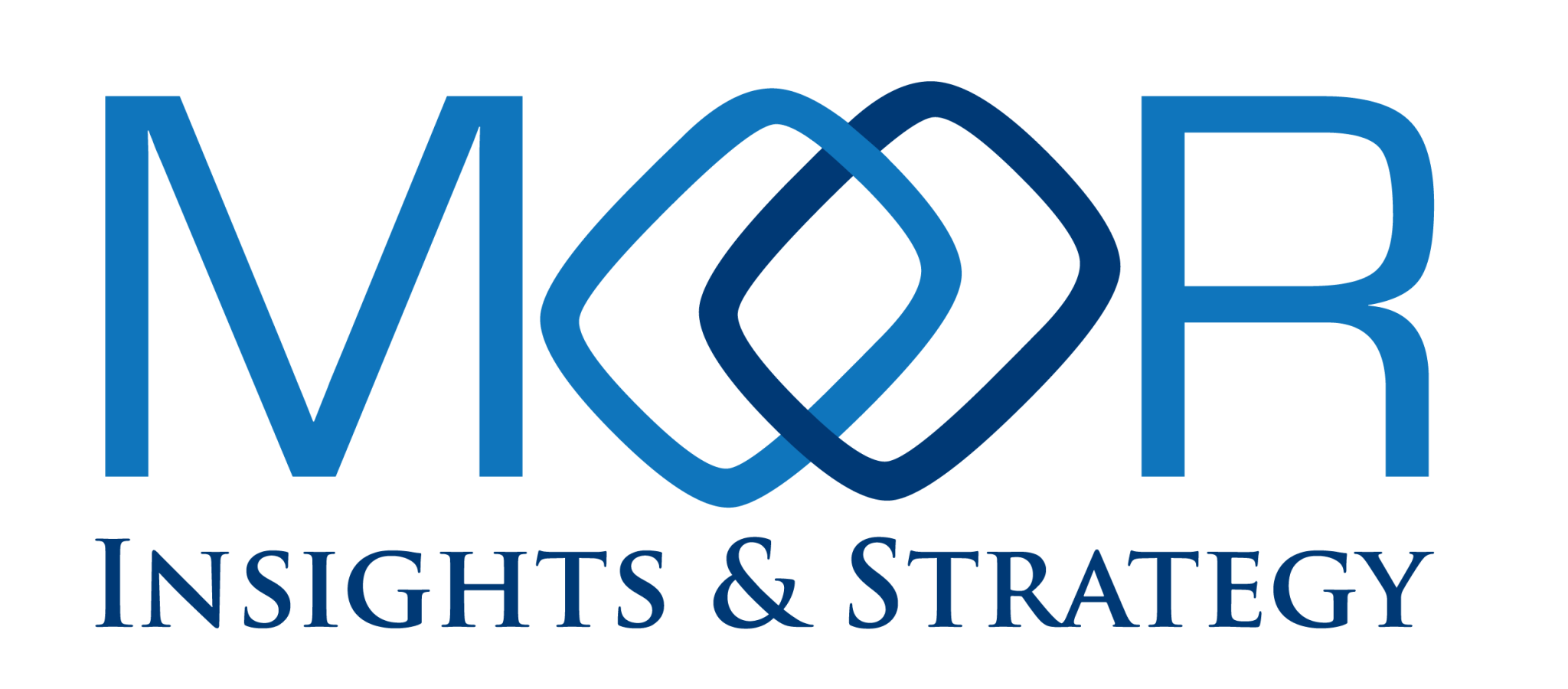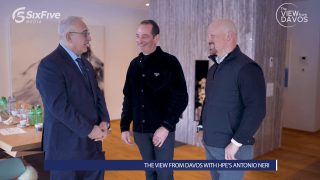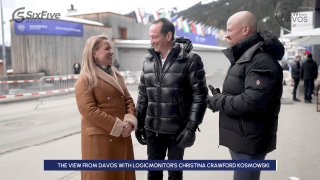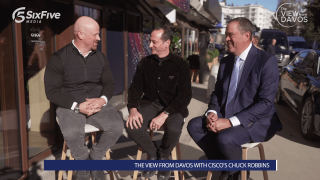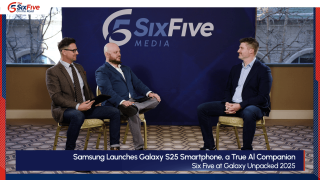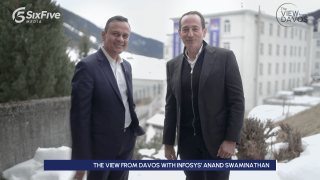On this episode of The Six Five Webcast, hosts Patrick Moorhead and Daniel Newman discuss the tech news stories that made headlines this week. The handpicked topics for this week are:
- Microsoft Wants to Drive Enterprise Trial With Copilot Chat
- Biden Leaves Trump an AI Regulation Love Note
- UK Leads in Antitrust Innovation, This Time With Google
- Meta Lays Off Low Performers – World Shrieks
- Will Lenovo’s Infinidat Drive Enterprise Value?
- Why World Isn’t Bored with TSMC Earnings
For a deeper dive into each topic, please click on the links above. Be sure to subscribe to The Six Five Webcast so you never miss an episode.
Watch the episode here:
Listen to the episode on your favorite streaming platform:
Disclaimer: The Six Five Webcast is for information and entertainment purposes only. Over the course of this webcast, we may talk about companies that are publicly traded and we may even reference that fact and their equity share price, but please do not take anything that we say as a recommendation about what you should do with your investment dollars. We are not investment advisors and we ask that you do not treat us as such.
Transcript:
Daniel Newman: Hey everybody, we are back, episode 246 of The Six Five Podcast. It’s Friday, Pat, it’s the best time of the week. It’s always the moment of rejoice, rejuvenation, enthusiasm, excitement, passion and conversation. How you doing buddy?
Patrick Moorhead: I’m doing great. It’s kind of weird, some weeks I’m just deluged with advisory calls and everybody’s like, “I need time, I need time.” And this week I had a bunch scheduled but probably half of them were for various reasons, but some pretty good lifts. I had a personal best on bench press, that’s a plus. I did have some really good advisory calls and just getting ready for Davos in Switzerland. I fly out on Saturday.
Daniel Newman: I know why those meetings got canceled by the way, it was you posted, I can’t believe you told everybody about your new G700 and then you posted about it and then I think some of the customers were like, “Clearly this guy’s making too much money and doesn’t need us anymore.”
Patrick Moorhead: That’s right. Your post is basically, “I’m going out in my G700, I’m going to eat a lot of ribeye and then I’m going to finger wag everybody who isn’t at WEF and tell them to reduce their carbon footprint, stop eating meat because it creates too much methane gas and eat some bugs while I’m there.” No, I mean I’m looking forward, I am now officially a globalist. So yeah, it’s going to be great.
Daniel Newman: Yeah, you live in your little orbit of pretending that you weren’t always a globalist and lying around. You lost me at ribeye though, come on, gently massaged wagyu, probably dry-aged, grass-fed, grass-finished of course.
Patrick Moorhead: Yes.
Daniel Newman: You’re probably one of those guys that actually goes out with the butcher and looks at the cow. You kind of massage like, “Yeah, this is the one. This is the one.”
Patrick Moorhead: By the way, the funny part was I got congratulations on the jet, by the way G700 is fully stocked as $100 million folks. And there were some people who responded to it with laughing emoji and simply were like, “Man, that’s great. Congratulations.” Folks, $100 million, think about this, not going to happen.
Daniel Newman: Hey, hey, don’t underestimate what’s possible, don’t underestimate what’s possible.
Patrick Moorhead: I’m just saying right now buddy.
Daniel Newman: It’s the world’s best technology podcast.
Patrick Moorhead: No, it is, it is. I mean, this thing could go crazy.
Daniel Newman: Well, and I don’t think we can fully start to roll our plans out to everybody, but after 246 episodes, The Six Five may be getting a bit of a face lift in the near future, I think we could disrupt ourselves. And that’s not because our show is stale, we know it’s amazing and awesome and every week you want to know about the six big topics, but as we’ve evolved our banter as you’ve gone from fat to skinny and now muscle-y… You’re like Jeff Bezos, man, I saw Bezos in the Polo launching the Blue Origin. I’m like, “Damn, that dude is ripped.”
Patrick Moorhead: I know, I know, guy is getting jacked.
Daniel Newman: I got down and started doing pushups when I looked at that picture, I’m like, “Crap.” It’s like if he can do it, I can do it. But I’m even going to update my logo on this stupid frame that this thing is in because I hate that logo and what it represents and the idiots that helped create it and all that goodness. But hey, yeah, we got a great show, Pat. I mean, we got a lot to cover today. We got some macros, some micros, some topics, some M&A and we got some big events. We are going to be in Davos, Six Five making its first presentation, Futurum’s launching its biggest CEO AI research study of its kind. The band is getting together, we’re going to have some great conversations out there.
And Pat, there’s just a whole lot more going on in the world in general. We got the inauguration of the president, number 47, also number 45. That’s going to be a big moment. It seems that there’s going to be no politicians showing up there, but there’s going to be a whole lot of CEOs. No Democrats are going to show up, but a lot of CEOs are planning to come. Very interesting times we live in, all the CEOs have now been to Mar-a-Lago to kiss the ring. And we’re going to get a Bitcoin Reserve, that’s pretty cool. So for those of us that bought crypto, it seems that Donald Trump’s administration’s going to drive parabolic ness to our portfolios. But also, there’s some big news. Microsoft made big news this week. There’s some new AI regulation. Biden leaves the White House with a love note, love that topic. Who came up with that crap?
Patrick Moorhead: Our producers are amazing. I want to thank the back office for all the hard work they do.
Daniel Newman: Yeah, they are really good at their job, I have to say. Next level, next level. And it’s really driving this podcast into the future. The UK is pushing antitrust regulation, there’s a shocker. One of my favorite topics, big companies laying off unproductive people, I know, seems insensitive. I’ve got an opinion on that. There was a little M&A this week in the storage space, I’m going to let you sort of take that one, but we’ll talk about it a little bit more. And then of course the big tech earnings wave is led by TSMC coming out first. TSMC always the great indicator of what’s to come, especially at the sort of tier zero one of chips and infrastructure. So there’s a lot to cover today, Pat. By the way, for everybody out there, this show is for information and entertainment purposes only. And while we will be talking about public companies, please don’t take anything we say as investment advice, Pat, so much to cover, don’t do it, don’t do it, just don’t. By the way, that QUBT company, I’m just going to say this right now, the one that was a QUBT, actually, the fraud charges have started to come out today. I saw them hit. You just don’t go from making energy drinks to quantum computers in short order, it doesn’t happen. I’m not saying they’re real, Hindenburg research actually shut down this week after.
Patrick Moorhead: I know.
Daniel Newman: They were so good, they were like 90%. I was looking down the list of all their short reports and half of them were down 99.9%, meaning they absolutely nailed it. I think about 10 of them they maybe got wrong, but what a batting average. That’s a really hard thing. And the guy actually said, Pat, he goes, it was like killing him. It’s like being the guy at the craps table that plays the don’t pass line. It’s like even though statistically probabilistically it’s maybe the second-best bet on the table besides the actual pass line, so if you’re wanting to play that off the odds, but you’re just the *censored* if you actually are the guy. And so being short and being publicly sort of that sort of short research, terrible place to be, especially with the bullishness that exists in our market, people want the market to go. Pat, let’s dive in though. Satya Nadella, I mean look, it’s an agent war now, we’re in agent wars. Everybody’s talking. I think there’s going to be a huge topic this week at Davos. Pat, what did Microsoft announce this week?
Patrick Moorhead: Yeah, so Microsoft brought out another flavor of Copilot, this time it’s Microsoft 365 Copilot Chat. I know I saw a lot of snarkasm out there saying, “Oh, it’s another week, another Microsoft Copilot.” No, I feel you. And first of all, when I look at the breadth, first of all, Microsoft has a consumer entity it needs to take care of and it has a commercial enterprise, medium business, small business. And then you have vertical forms, right? You’ve got, for instance, Copilot for Sales and things like that. So I get the snarkasm and the way that I like to measure things is on is it delivering unique value? And if I look back and we do a lot of research on this, what are the key inhibitors to enterprise AI adoption? And they shift from quarter to quarter, but not as much as you might think, right? You’ve got the data management piece, you have the, “What’s the ROI?” “What’s the skill sets?” And one of them is cost, okay?
So when you look at how do you get somebody excited to pay for $30 per month per seat, if you have half a million employees, it might look, “Oh my gosh, this is a ton of money.” Now let’s say that that’s saving you $20 million a year, that cost becomes negligible, right? It’s like, “Take my money type,” type of stuff. And I think as humans we’ve seen this, I would pay a lot more for perplexity than it charges. So you have to get the organization to try it out. You need trial to demonstrate the return on investment. And what this new Microsoft 365 Copilot Chat does, it adds this pay as you go mentality, not per token, let’s say if you were in the data center, but per message, okay? One penny per message. And I think Microsoft did a pretty good job showing, and you can hit up the screenshots on X that I get laid out here, how it compares to the full up Copilot versus Copilot Chat, what would a, I’ll call it, full rotation around the planet if you are actually trying to do something for an entire day?
So for instance, a sales performance agent, the estimated cost per day doing four generative answers, four tengraphs, grounding for messages, you’re looking at 12,800 messages and that is really cheap when you’re looking at a penny. Plus, you could buy these packs, which is, I’ll call it a tweener versus pay as you go message packs going versus a full up Microsoft 365 Copilot license. So listen, I get the criticism, but I think what they’re doing is the right thing and we’ll see if it generates usage. The other thing when I step back, Daniel, I was wondering, does this indicate that Microsoft’s invested the right amount of capital expense to be able to unleash this to the world and they actually have capacity now to do this? I think we’ll figure this out as we get into the months and the quarters, but I like it.
Daniel Newman: Yeah, I mean, we know the agentic movement is really substantial. Our team has done a pretty big TCO breakdown on it, we’ve got it pegged at about $4 trillion of labor that we believe can be augmented or completely displaced by agents in 2025. We just kind of looked across the labor pool and we looked at how much of the labor we estimate could be done currently by agents and then we basically took a percentage and a fraction of that. So that’s kind of the opportunity that’s at stake. And of course four trillion in direct labor doesn’t mean 4 trillion in spend on software, the idea would be that that labor could be done at some fraction of the cost of software. And then there’s always what I call the prune to grow, meaning you find those efficiencies, reinvest in productivity gains. But agents are going to totally change the calculus by which businesses are run.
Microsoft has a massive opportunity and a real challenge in front of it. I mean, the massive opportunity for Microsoft, is it literally has all the users. The install user base, I look at the Microsoft opportunity for agents is a lot like the Apple opportunity for on-device AI. When you have all the users already there, you build the right product and you’re going to get people to use it. The business model has been in question. Look, I mean the external sort of rumor mill on the street is that there’s some concerns about the investment where people have gone in on Copilot, they’re paying the money for it, they’re not sure they’re getting the value. That’s been anecdotal, you read it across the internet and I’ve actually talked to some CIOs and a lot of them are saying like, “Yeah, we’re using it, but we’re not sure.” So this is also really interesting, Pat, because it’s like a new way to think about how to charge rather than that sort of bigger per seat fee. Now I have to say, the $20 a head or $50 a head or any of those sort of numbers, if this stuff works well and is really deriving value, it’s nothing.
Patrick Moorhead: 100% Daniel. I mean, imagine if the Word document to PowerPoint actually worked well. I’ve tried it out a bunch of times, it doesn’t work great. But I got to tell you, I am signed up for the ChatGPT Pro, right. When I want a long reasoned answer, I am paying it and I’m probably going to keep paying it until something better comes along. I mean, how much would you pay for Perplexity? You know.
Daniel Newman: I mean, at this point I’m not.
Patrick Moorhead: Oh, funny you’re not using Perplexity Pro Search.
Daniel Newman: I am using it, I’m not using the paid version.
Patrick Moorhead: You can’t use Pro without paid.
Daniel Newman: No, I’m not using the pro version, the paid version, I’m just using the free version. I have a few of them. I have Gemini Pro. I’m using that one right now, I had ChatGPT, I canceled that one. We’re kind of a Google in our workspace as our corporate platform so I’ve rolled up a lot of Google features and functionalities.
Patrick Moorhead: I pay for all of them.
Daniel Newman: Well, that’s just you though. You and I are just different that way. You’re sort of the tear everything down, geek out on it, share benchmarks. I let Signal65 do that kind of work, that’s my take. Let the geeks do the geek stuff. I mean, Pat, we are the only lab out there that has, what, I think a 72 node H200 system up and running and a 64 node MI system? Just saying out there, there are no other labs out there that have the type of cool tech stuff that we do. So anyone out there that wants to know more about that, you got to check out our lab people. Sorry, no promotion on the show, Pat, stop it, stop promoting please. This is a organic show, it’s supposed to be here to entertain people. Anyways, the agent space is going to grow rapidly, Pat, we’re going to talk a lot more about this. It’d be very interesting to sort of see adoption. I mean, it’s all the opportunity comes in the outcomes. If people are getting value in the outcomes, this type of model, just like you mentioned with using Pro, you’re willing to pay for it because there’s a ton of value in it for you. People need to get the value, they need to see the agents work. Right now it feels like a little bit of architecture across the board, not just them, Salesforce, ServiceNow, Workday, all the companies talking to agents, but I think very quickly we’re going to see sort as the data and the application and the agentic workflows become well understood and accurate and trustworthy, that business is going to just explode. I’m super bullish about it for this year.
All right man, we got to get to the next topic. We can run with this all day long, but let’s talk about AI regulation, Pat. So, what, eight days, you and I last Sunday night, eight days before we’re getting kind of a brief overview on what’s going on the Biden administration decides to push forward on some rules to basically further limit the exporting of AI chips. Now, again, this is rules on top of existing rules and the rules on top of the existing rules that were designed for really calling what’s now not much more advanced than what’s going into some advanced GPUs for gaming are now being put on these restricted lists. And let me be upfront about this, we have a real sort of difficult needle to thread because China is getting access to our most advanced semis, they always have, they always will. And there’s a lot of sort of muckety muck about how has that continued to happen. You get all these export controls and oh, it’s shipping through Singapore, well how does that happen? TSMC is shipping things to China they don’t even know, people are tearing apart boards and finding hardware inside of equipment that’s not supposed to be able to get there. So that’s kind of at the core of why this goat rodeo that is import and export controls is such a big thing with AI chips.
To be clear, AI chips are going to be the foundation in which the world’s economic growth and basically security is going to be built on the winner of AI will be the winner of the economy. The winner of AI will be the winner of national defense. But now the thing is, unlike these really restrictive rules about China, Russia, Iran, North Korea and other adversarial nations, we’ve expanded that with these new rules that basically make it very difficult for companies in Switzerland, companies in Iceland, companies in places that we would typically consider to be neutral or friendly… You can’t be more neutral than Switzerland can you, Pat? And basically making it very difficult for them to purchase and to implement next generation AI technologies. I mean, NVIDIA of course one of the biggest and most outspoken on this particular one, it’s 120 days from now it’s supposed to go into effect. Pat, I think we could talk a lot about what’s in this rule, I want to use my little bit of time that I have left before passing it to you to just say I genuinely believe this was nothing but 11th hour grandstanding by the Biden administration, not even sure Joe Biden, President Joe Biden’s lucid enough to know what he signed into law at this point. I think that the idea is not on his administration’s watch. So meaning that if China does over the next four years move quicker, we’re seeing what they’re able to do in frontier models, we’ve seen at least rumors.
Again, nothing is ever confirmed as to how things work there, but the stories that have come out about their most advanced frontier models being trained on older chips being competitive with our newest frontier models probably worried some people. But I think Biden does not want the world to ultimately walk away thinking that his presidency and his policies enabled China, North Korea or other adversarial countries in the world to gain or become on parity with us in any way around AI. In the process though he is putting business at risk, he’s putting our largest enterprises at risk. There’s a better way to approach this, it’s something we could probably talk about at another time. I think Trump will reverse this or most of this because I feel like it’s a blunt instrument being deployed to solve a problem that requires a scalpel. And we can spend more time, Pat, maybe some time on how we could actually address the need for these things, but I’ll pass that back to you.
Patrick Moorhead: So first of all, hat tip to our producers, I don’t know if any of you read history, but ex-presidents leaving the new incoming president an envelope goes back to 1993 with George Bush and Clinton, and then we saw it with in 2001 Bill Clinton to George W and then George W to Barack and then Barack to Donald Trump, and then even Trump left a note in 2021 to Biden. So this is a love note that Biden is leaving Trump. And with that said, thank you production team.
Daniel Newman: Nice job production team. Production team’s getting a bonus, they’re going to get a quarter zip Six Five media shirt.
Patrick Moorhead: Exactly, exactly. But here’s the thing, here are the facts. The facts are there are certain set of regulations that is keeping China, Russia, and North Korea and others from gaining access to technology that they could use to hurt the United States and others. And the second fact is that China is getting around it and there are countries and people who are helping it. I mean, years ago when this first BIS thing came out, I said, “Hey, look at the size of an A series. Look at the size of a graphics card.” You can smuggle those in your luggage if you wanted to. I mean, my gosh, look at how arms get over to the Middle East. I mean, it’s just like this is really, really hard. So I think the intentions are good here and I personally agree this is essentially the modern day nuclear weapons capability and centrifuges. But I just have to question, again, I think you had a great analogy, a scalpel versus blunt instrument here, I mean, listen, the BIS couldn’t even get the link at the bottom of their website to work, okay? And this is going to be the traffic cop to authorize all of this. That is an absolute freaking disaster, okay? And I don’t know who puts this stuff together, because you might get ahead of this and say, “We are staffing up, we’re going to give a 48-hour turnaround.” Because Daniel, we’re in this age where trust in institutions is at an all-time low, whether it’s the press, whether it’s government, and this needed to come out. So I also think the industry should work together to come up with some suggestions on the best way to do this. In our conversation with NVIDIA, they had some interesting suggestions, but I think this is getting very serious now. Maybe the other way to look at it, and Dan I know we’re looking at remapping our show, maybe we have a segment where we play both sides of something but-
Daniel Newman: I think I kind of did that. I think I kind of was trying to explain what-
Patrick Moorhead: Yeah.
Daniel Newman: Yeah, we tried.
Patrick Moorhead: But other side of this, because this thing is nuanced, but yeah, let’s have the industry-
Daniel Newman: No, you don’t want to be the president that basically allowed, it’s like allowing nuclear technology in the past era, I mean effectively there is kind of the legacy here, “I was the president that enabled North Korea and China to become AI global leaders because we basically gave our best IP away.” And we also know what China does when it gets access.
Patrick Moorhead: That’s pure politics.
Daniel Newman: When China gets access to our IP, they build their own and they tend to do a pretty good job of it. So they may not be able to create, but they’re certainly able to copy very effectively and they’ve done so. What was the old joke, when you talk to a certain CEO about VMware, he said something along the lines of “You know how many copies of VMware they have in China, you know how many licenses?””
Patrick Moorhead: Like one?
Daniel Newman: One.
Patrick Moorhead: Hey, the final comment I want to make is in the other side-ism here is like we saw with Huawei where defense departments saying, “Hey, they’ve got back doors. We need to get Huawei out of all western technology including their phones and their infrastructure,” people are asking, “Okay, show me the evidence.” Does Portugal want it aired out that they were the country that let all this stuff go through? And by the way, there are countries that are setting up data centers that are way beyond the capacity of the EU, of any customer coming in. And you have a lot of stuff going on in the Middle East as well, who’s going to soak up all of those? So anyways, this is a nuanced discussion, it’s not black and white. What is black and white is that China is skirting regulations and people are helping them. And the third is that anything tied to the government has a level of bureaucracy and time that will slow down commerce. This will slow down commerce based on everything I understand about it, and prove me wrong, everybody out there, if I’m wrong on that.
Daniel Newman: Yeah, absolutely. Pat, we’ve got to keep moving. We are doing the 620 today, good on us. So let’s stay with regulation, nonsense, craziness. What’s going on in the UK, Pat? Because they’re not EU anymore, but I mean, they kind of are sometimes.
Patrick Moorhead: Yeah. So I got up I think Tuesday morning, something like that, I’m supposed to be talking chips on Yahoo Finance on their opening show and about five minutes beforehand it’s like, “Hey, can you talk about the Google antitrust situation?” Always fun. But you know what the easy part is Dan is we cover antitrust so much that it’s like a copy and paste. So essentially when the UK left the EU, they had to set up a lot of their own bureaucracy and one of them is around antitrust. And as we’ve seen through Adobe getting shot down with the major acquisition they were making, the UK is trying to flex its muscle and be the top innovator in an antitrust regulation. And this time it’s with Google. And the investigation is very similar to other investigations that we’ve seen around the world, which is the following, that Google uses its monopoly power in search to unfairly limit competition from either competitors to its own applications, which could be advertising in, let’s say, restaurants that could be Google Maps versus going to an OpenTable or the French version of the open table.
And this is very similar in line with the EU’s DMA, which says there are gatekeepers, okay? The UK has a different flavor of it, but it’s essentially the DMA. Google has what’s called AdWords, I think it’s called Google Ads now, came with an acquisition, Daniel, I think they made in like 2000 back when I was at Alta Vista, which essentially is the mechanism to bid on advertising. And Google has their own property. So this will be the debate. And it’s funny, when I got on my big quote out of Yahoo Finance was, “Just ignore this thing.” I think we’ve been trained in markets that when’s the last time we saw a big ruling come down from any antitrust other than a fine that actually made a difference? So I’m kind of other-siding this with, I mean, I guess what the EU forced Apple to do on certain things kicking and screaming, I mean, I don’t think that has any material change to their short-term or mid-term business. So yeah, the market yawned and I yawned and that was the pull quote, that Yahoo Finance pulled out.
Daniel Newman: Yeah, so I love this. Pat, I don’t know if you’ve watched the big catch of the rocket again yesterday, second time with the boosters and Elon. And there’s this great visual of the EU, and I know again UK is not EU, but a lot of its kind of lagging policies are still of its time as part of the EU and the EC. And it shows a picture of Musk’s SpaceX catching the rocket and then the next one is a guy with a water bottle and a little cap and the cap is disconnected, you know how now on their water bottles when you pull them off, you can’t actually remove the cap, they kind of hang, they dangle. And that’s the sort of span of innovation that goes on there. If you actually listen to the Rogan Pod with Mark Zuckerberg, Mark actually came out pretty clean for the first time. Again, new Zuck, I don’t know who this guy is. This is Red Pill Zuck, I think, the red pill Zuck.
Patrick Moorhead: Yeah, which Zuck?
Daniel Newman: New Zuck comes out and he’s kind of talking about how basically they just stifle innovation and they just fine people. So basically, just so you know, I can get done more quickly with this topic, not because it’s not a good one, but because you covered the technical part of it pretty well is that the US innovates and the EU fines, and they basically penalize because they haven’t figured out how to enable it. And by the way, maybe they do know how to do it, but they just don’t want to do it. And so alternatively, no companies are really being built there of substance. And then meanwhile, when US companies come there bring their innovation there, they sort of create these tolls and the tolls are in a version of fines and regulation and US companies pay it and it raises money for the EC and the EC, but in this case, in the UK… I mean, look, there’s some real fundamental things with Google that need to be looked at, just like the real fundamental things with Apple that need to be looked at. These companies have built these really, really deep interconnected modes. What I think-
Patrick Moorhead: Concentration is not good for innovation, it’s just not.
Daniel Newman: And the one thing I’ll leave this at is that effectively antitrust law needs to be redone. And I’ve said this and I’ll say it and I’ll keep saying it is that the fact is it was originally intended for two things, to increase competition and remove consumer harm. And the fact is in the process of reducing consumers aren’t always harmed. The consumer experience across the Apple ecosystem or the Google ecosystem or the Microsoft ecosystem is generally a better experience. So you have these completely unified connectors between different parts of the ecosystem connecting you between devices and locations and experiences and it’s good. And the thing is, by actually breaking that up to give people the opportunity to compete in parts opens all kinds of security vulnerabilities, it opens up more friction in the experiences to get between an app and a device and the security and the payment. So the antitrust rules just suck. They suck because they don’t work. If you want people to have great experiences, you actually somewhat are an enabler of anti-competitive situations because these companies build these motes and the motes are great experiences, people want that. So nobody cares. So just keep fining EU, that’ll get you where you want to go eventually, you can raise taxes to 120%, that’s the plan. You can tax everybody and then tax them again when they spend the money they don’t have.
All right, we got to keep moving, speaking of big tech and Mark Zuckerberg Meta puts out an announcement this week, and by the way, not the only one, we’ve heard some things from Microsoft about some layoffs, but Meta is reducing 5% of its workforce. But over the last few weeks, Pat, you’ve probably heard DEI programs being shuttered everywhere, basically almost every company except maybe Apple has decided, every major company, tech company has decided to either roll back or completely eliminate this effort. Now this to me, by the way, is just an indication of when you see a CEO that you think is really on board with your political view spectrum, right or left, don’t care, just realize that CEOs are really great chameleons for returning shareholder value. So if that’s the right trend line, they’re going to get on board. When you see the pivot though, don’t be surprised because right now what you’re getting is a Trump pivot, you’re getting a MAGA pivot and people may or may not love that but what’s happening right now is we’ve kind of gone from a very equity, equality, diversity driven sort of structure of hiring to a complete flip to meritocracy.
And so basically what Meta announced is 5% of the workforce, which isn’t a ton, but it’s a meaningful number of a company that size, are going to be let go strictly based on non-performance, something that hadn’t really happened much over the last four years because frankly it would’ve been very difficult, companies would’ve been chastised, canceled. If the thought process was that the elimination was being done for reasons that were just merit, especially if it affected what are going to consider to be protected groups. This is a really interesting tightrope we’re walking right now. As CEOs of companies, Pat, you and I, we constantly face the situation of trying to decide how to make sure we incent performance, how to make sure that we always are building a culture that rewards the highest performance company, doesn’t sort of cater to people who are dragging the organization along. And also Pat, and I’ll kind of just say this and maybe kick it your direction, but starting with Musk, starting with Hock Tan, forget even the whole trend lines of DEI and non-DEI, just CEOs that have basically come in and said, “We’re bloated. This company’s over-staffed, we don’t need this many people, we can run with less.” I know there was a lot of sort of we media destruction of X, but from what I can tell, X is going to be worth more than Musk paid for it, it’s going to end up being more valuable. We’ve seen with VMware, I think Hock Tan eliminated more than half the employees now that one’s rolling and running.
So anyway, I think this is great. I’m not going to say, I think companies need to always be thinking about diversity, they always need to be thinking about hiring the best people and of course from diverse backgrounds that can bring more insights to companies. But I think meritocracy wins. I think companies perform great when they’re built for performance. That’s what our great innovation that we just talked about in the last segment comes from. I encourage it. I think that companies, and I think with AI path, this is only going to accelerate. I think with agents and AI, 5% might become 20% for a lot of companies in the next year or two.
Patrick Moorhead: This gets me back to a quote that I’ve been seeing a lot, hard times create strong men, strong men create good times, good times create weak men, and weak men create hard times. When I came out of college in 1990, the job market was absolute *censored*, okay? It was hard to get a job and you were lucky to have a job, okay? I also grew up in the Midwest, which is the Rust Belt, which is the fentanyl capital of the world where a ton of people lost their jobs. And with this amazing increase in GDP per person, we essentially even globally have eliminated most of poverty. Have you ever seen the curve, dude? I mean, it’s unbelievable. So I think this cycle, we’re not even in a bus cycle, Dan. It’s like a little blip cycle. We over-hire during the pandemic and this is a rebalancing, and like you so astutely said, AI is kicking in this work from anywhere thing, companies allowed it and promoted it, got out of hand, they didn’t feel like they were able to manage their troops effectively enough. So we’re here. Yeah, you’re seeing the rubber banding. Everything is circular, folks. One of the reasons I’m a student of history is because these big things don’t surprise, this shouldn’t surprise anybody. So net-net he’s making a business decision and my gosh, have you ever thought that eliminating layers and eliminating people actually speed stuff up? I see it every day. I mean, I was in the most bloated company you could work for back in 1992, which was AT&T, fricking bloated and huge, right? This was post-breakup, but I see it and even, gosh, I think I managed more than a thousand people when I was at AMD at one point and it was like stuff sped up after we did mass layoffs when we changed the process and when we prioritized. So this is where we’re at, the new Zuck is interesting. I can’t believe he didn’t stop by when he was in Austin for Joe Rogan, I’m going to need to have a talk with him.
Daniel Newman: When we get the new format, I mean, I think we are going to be talking to his right hand in AI in the near future.
Patrick Moorhead: Yeah, we’re going to be talking to Yann LeCun, firebrand, Musk hater, but one of the most powerful people in artificial intelligence right now.
Daniel Newman: Yeah, I look forward to that one. Everybody out there, keep tuned in for that one, that’s going to be dropping on The Six Five network. Very exciting. We’ve got some great conversations next week. I’m jazz dude. I don’t like leaving on Saturdays, I’m not going to lie. It definitely makes for these weird weeks. By Wednesday you’re like, “Is it ever going to end, the week?” On Wednesday night. But this is a once a year pilgrimage, we’re going to make it rain. All right Pat, we’ve got a couple more topics and of course we’ve taken forever, fiveever, Six-Fiveever to get here. But there was an acquisition made this week, a very, very smart tactical one. I think one of your analysts, Matt Kimball, did a really nice teardown, breakdown, the producers are great producers with their new shirts, can put that in the show notes by the way, but what happened? Who acquired who this week, Pat?
Patrick Moorhead: Yeah, a little bit of a backdrop. Lenovo is the market share leader in PCs. They’re also the market share in lower end storage, and that’s under $25,000. But where Lenovo has struggled is in the enterprise data center for various reasons. They’re very competitive in small and medium businesses, they do pretty well with governments, but they just struggled in this area. And it’s a combination of product fit and go-to-market. I know from talking to the leaders at Lenovo, they’re doubling down on getting into the enterprise data center in a much bigger way. And one of the product gaps they had was high-end enterprise storage. And they’re currently partnering with NetApp on this, having a lot of success in China. I do believe that Lenovo is also the ODM on a lot of NetApp’s equipment. It’s not a challenge, again, in the enterprise for Lenovo and China, just in even ASEAN countries and the West and even South America. So what Infinidat brings, and it’s interesting, they’ve been around since 2011, they’re not this recent startup that came up, is they have a full range of enterprise storage solution and it’s a combination called the InfiniBox SSA. That’s an all flash option, they have a hard drive option. They even offer cyber resiliency, which is the thing that all storage providers are trying to get into, but it’s a rabid market at this point as well.
So we’ll have to see. I mean, there’s a lot to be determined on this, like, what happens with the NetApp-Lenovo relationship? I’m hearing back from unnamed sources that it’s a non-issue with them, and I don’t know if that’s corporate speak or not. But this does increase the chance that Lenovo can increase their level of success in the storage market. When it comes to the enterprise, I think it’s more of a go-to-market. I’ll say out of the other side of our mouth, it’s having the content, it’s having the case studies, it’s having the sales coverage that I think is going to make the difference because, man, competition is tough. You look at Dell, you look at HPE, even Cisco’s getting invigorated in the compute market here that comes with storage, it’s a really tough market.
Daniel Newman: Yeah, so good comments. Let’s add in the show notes too, Camberley Bates on my team wrote a really nice research notepad, this was all about addressing the higher end, addressing the fact that certain parts of their storage portfolio are really relabeled of other people’s storage technologies. This gives them that high-end sand, high-end data protection that has been missing from the portfolio rounds out the Lenovo ISG business. And I think it’s a good home for where Infinidat lays out eventually and ultimately. And the only thing I’ll add to that is this whole storage segment is going to change massively. So there’s sort of the ability, it’s kind of X86 and the CPU versus the GPU and the AI accelerator. There’s going to be a near term era of basically continuing to build out what is sort of really your traditional storage arrays, and then there’s this neo storage technology that’s being developed for the AI era and it’s going to look very different. So I think Lenovo is sort of a addressing and rounding out its core sort of X86 CPU and storage attached and networking business, and I think next they’re going to really need to be thinking about how to round out the future of this kind of neo data managed platform that you’re seeing with the vast Wekas and even the next generation higher end NetApp platforms and et cetera. So a good move, good landing for Infinidat to be very interesting. This should close, I don’t see any issues with this one.
All right buddy, let’s round this out, Pat, TSMC. So we are heading to Davos, the inauguration and next week will be the last sort of quiet earnings week before the tech boom for about four or five weeks after that just absolutely explodes. But every quarter, Pat, TSMC does a couple of things to sort of give us a glimpse into the future. First and foremost, they report every month. Because of where they’re traded, they report every month a revenue number so there’s really never a big surprise when TSMC reports, but then they come out with a quarter, and this is where they share some guidance, they tend to share a little bit more about node density, where buyers are buying in on which node, which interestingly enough I think we’ve seen now their 3, 4, 5 are now close to 70ish percent. The vast majority of the business now is on the leading edge. But I mean realistically, Pat, it was very, very strong in a very condensed, concentrated part of the business. So once again, high performance, which is inclusive of their AI, was the big, big winner for the company. It outperformed again. Probably one of the most interesting statements that was made by the TSMC CEO was his 40% estimated CAGR for AI accelerators providing a really bullish outlook, not just for Nvidia and the GPUs, but also the whole Broadcom, Marvell, what’s going on with Microsoft, Amazon, all the different accelerator manufacturers or the companies that are making custom AI chips. This seems to be a part where he really thinks it’s going to buoy the long-term growth of TSMC.
Ironically though, smartphones, Pat, is still down, higher single digits. I mean, we have not seen the recovery on devices that we expected. The inventory took longer to sell off, that number’s not really growing. So when you see TSMC crushing it is a one-to-one AI is crushing it. The AI business is just good. And now the company’s going to be making big CapEx investments to expand capacity, they’re trying to address a lot of packaging needs with CoWoS and CoWoS-L and the next generation of CoWoS. And of course I always say that even though they’re not doing the memory part, this is also really a good indicator of the future of HBM. I mean, if the AI business is this strong, the HBM business is going to follow this trendline, Pat. But my take is the chip companies that are heavily connected to the AI chipmaking, Pat, they’re going to have a good quarter.
Patrick Moorhead: So the world is not bored with TSMC earnings, but I am. I mean, there’s no insights. Everything continues, right?
Daniel Newman: I thought I gave some good insights.
Patrick Moorhead: No, no, you did. But I mean, NVIDIA is moving to CoWoS-L.
Daniel Newman: Yeah, I get it. I think it’s more it’s the leading indicator of what part of the semiconductor industry is doing well, and I think it’s when you get the kind of bubble bears out there saying AI is a bubble and CapEx is going to collapse and nobody’s buying AI, and then you look at these numbers, Pat, you’re kind like, “Yeah, but someone’s buying it. I mean, someone’s buying it.” By the way, I mean, I saw a number, look, I mean the number in this Yahoo note said Apple and Nvidia, they’re spending 38 to 42 billion on technology and capacity this year, up way more than expected. So I mean, the CapEx rolls on. And this also obviously has to fuel the chip equipment makers, right? ASML, Applied, all those companies have to be really feasting on this as well.
Patrick Moorhead: They have. What would be interesting, the only thing that would be interesting to me is they give some indication that Microsoft’s pulling back. Amy Hood talked about a leveling out in the second half, and then the question is what actually does that mean? To support what level of end user demand? Now that would be interesting to me. Or a spike up, we’ve had this permafrost on the industrial IoT including non-EV cars, right? That would be interesting. So I don’t know, man, it’s a big yawner to me, but I appreciate you bringing the juice on this.
Daniel Newman: I’m going to convince you this isn’t boring at some point that it’s not. But yeah, no.
Patrick Moorhead: No, it’s not always boring, it’s like this one was boring because it’s like okay, same thing I said last quarter and the month before and the month before that. Hey, hyperscaler enterprise data is big. Ooh, no way.
Daniel Newman: Well, Pat, when I was teasing out our new big, big survey that we’re doing on this AI and CEOs, I said, the big finding is CEOs think they’re going to use AI. I mean, so breakthrough kind of stuff. CEOs are going to use AI. Anyway, great show buddy. It’s a lot of fun. Like I said, as we wind down this exact format, it is just going to get better from here, it’s going to get better. We’re going to get more unfiltered. Pat’s going to get some packs finally, so he can start benching some real weight. I’m going to push him here, he’s going to get to 300 this year. He’s getting to 300 this year.
Patrick Moorhead: Maybe a derived 300, which means I got to push 250 for three and I just, dude, I don’t know, we’ll see, we’ll see.
Daniel Newman: We’re up in the creatine to 50 grams a day and I’m just going to start drinking TRT.
Patrick Moorhead: Yeah, yeah, I’m just wondering if I get my big bottle of blue anabolic steroids through customs.
Daniel Newman: Yeah, I don’t know if you’re going to ship yours. I generally stop over in Turkey before I go, get some from one of those local pharmacies. All right, everybody, I got to go, I got a meeting or something like that. Hit that subscribe button, join us for all the other episodes of The Six Five podcast. We appreciate you being part of the community. Look out for our great coverage from web each and every minute. Just during this show we booked two more amazing interviews, Pat, very exciting times.
Patrick Moorhead: I know.
Daniel Newman: Yeah, love you bestie. I’ll see you later.
Patrick Moorhead: See you, bro. Take care.
Daniel Newman: Bye.
